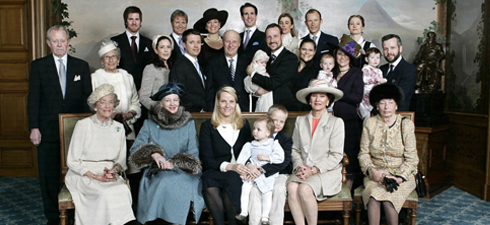"I monitor royal families in eight countries — the United Kingdom, Netherlands, Denmark, Belgium, Spain, Sweden, Luxembourg, and Norway — and the amount of public funds they receive continues to increase every year," explains Herman Matthijs of the Free University of Brussels. His most recent research shows that the British Monarchy — which is funded to the tune of 49 million euros per year by the British taxpayer — is Europe's most expensive. The Dutch Royal House is ranked at a close second with 40 million euros per annum and both of these families are much richer than their counterparts at the bottom of the table in Spain and Luxembourg, who are forced to make do with approximately 9 millions euros.
Royal apologists are quick to point out that without cash from the public purse, Europe's monarchs would be unable to pay for the maintenance of their palaces, their personal security, and official visits abroad. But can we be sure that this is really the case? The veil of secrecy that surrounds European royal fortunes makes it very difficult to draw definite conclusions about their finances. Europe's monarchs are unwilling to disclose a fully detailed account of their personal assets, and only the British and the Dutch royal families, provide a transparent record of the use they make of funds obtained from the state, points out Herman Matthijs.
Belgian monarch's fortune 100 times greater than official figures
So it is not surprising that the publication of a recent book, Het verloren geld van de Coburgs (The Lost Riches of the Coburgs), which alleges that the Belgian monarch has a fortune 100 times greater than the one recognized in official figures, should spark a public outcry. The only public statement on King Albert II's and the Belgian royal family's assets, which was delivered by a spokesman in 2007, declared that the monarch's wealth was limited to a property in the south of France and 12 million euros. However, the author of the controversial book, Thierry Debels, insists that the king also owns shares with an estimated value of one billion euros along with other assets that his ancestors hid in the former Belgian colony of the Congo — a claim that a spokesman for the royal family has described as "pure fantasy."
According to unofficial sources, most of Europe's monarchs are well placed on international rich lists: Luxembourg's ducal family has approximately 5 billion euros, mainly invested in property. And Dutch royals lead by Queen Beatrix, who used to own 25% of Royal Dutch/Shell, are not strapped for cash either. King Harald V of Norway, who is related to the British Royal family and the proprieter of numerous properties in the UK, had the good luck to be blessed with an enormous inheritance. So too was Elizabeth II, whose fortune has been estimated at 500 million euros. Ordinary citizens might be tempted to conclude that she is even richer, but that is because casual estimates of her wealth fail to take into account the fact that with the exception of a number of properties in Scotland and Norfolk, the palaces and other assets associated with the Queen are actually held in trust by the state — and that includes the Crown Jewels. At the same time, the maintenance of royal properties has become increasingly expensive: to wit the widely reported shortfall in funds required for the upkeep of Buckingham Palace, which is starting to fall into ruin to the point where it is dangerous to walk alongside the building. According to Judy Wade, the Royal Family correspondent for Hello! interviewed by Rzeczpospolita, in one recent incident, Princesse Anne narrowly escaped being hit on the head by falling masonry.
Swedish monarchy claims EU subsidies
Judy Wade is also keen to emphasize that the Queen is very much aware of her reponsibility to make good use of funds sourced from the British taxpayer, which is why she is very frugal. Some people might even describe her as miserly. She refuses to throw away clothing, which is passed on from children to grandchildren, and when prince Charles had the misfortune to lose a leash belonging to one of her dogs, she sent him back out into the palace gardens to search for it. However, such parsimonious gestures are not enough to make up for the heavy losses on the stock market that Judy Wade is convinced the British monarch sustained in the course of the financial crisis.
Experts point out that royal fortunes, which often include substantial property holdings, have certainly lost a significant proportion of their value in the crisis. At the same time, dwindling royal revenues have been stretched by the high cost of maintaining royal estates, which has largely remained unchanged. A few months ago, the citizens of Sweden were shocked to discover that in order to preserve the royal coffers King Charles XVI Gustaf was claiming 190,000 euros of EU agriculture subsidies per year. Elizabeth II also takes advantage of the same subisides.
Was this article useful? If so we are delighted!
It is freely available because we believe that the right to free and independent information is essential for democracy. But this right is not guaranteed forever, and independence comes at a cost. We need your support in order to continue publishing independent, multilingual news for all Europeans.
Discover our subscription offers and their exclusive benefits and become a member of our community now!












